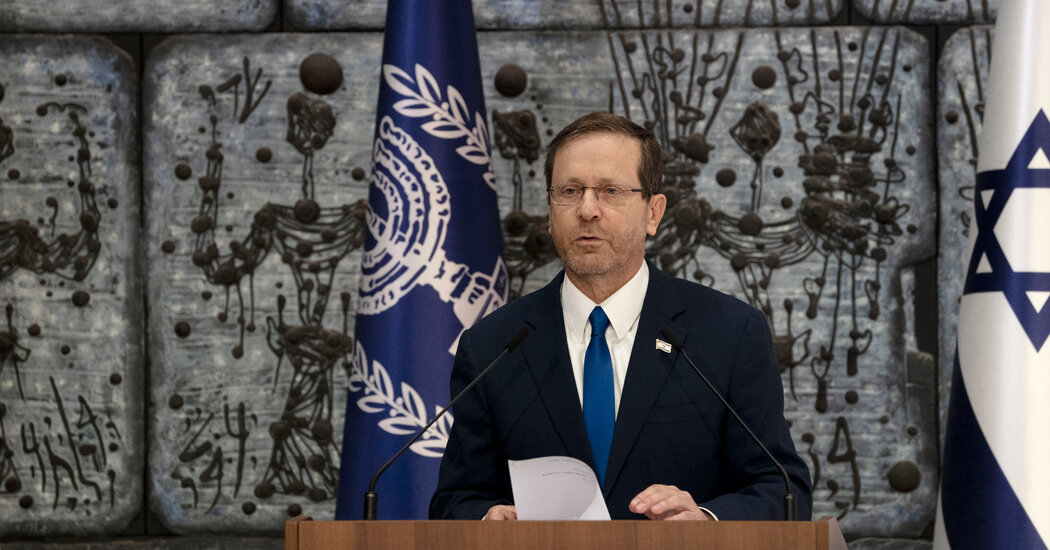The president of Israel presented a compromise proposal on Wednesday for softening a government plan to drastically overhaul the country’s judiciary — a plan that critics say would destroy the country’s liberal democratic system and that has sent hundreds of thousands of protesters into the streets in recent weeks.
But Prime Minister Benjamin Netanyahu rejected the president’s framework, reducing any likelihood of an immediate end to the country’s turmoil.
In an impassioned speech broadcast live in prime time on Wednesday evening, the president, Isaac Herzog, said Israel was “in the throes of a profound crisis” and raised the specter of civil war. Israelis have been taking to the streets in rolling protests against the government’s plan.
In an effort to avert a constitutional crisis and heal the acute emotional rift dividing the country, Mr. Herzog laid out his set of principles for judicial changes that he said reflected the broad consensus to which most Israelis aspire.
“The last few weeks have been tearing us apart,” he said. “Anyone who thinks that a genuine civil war, with human lives, is a line that we could never reach has no idea what he is talking about. It is precisely now, in the State of Israel’s 75th year of independence, that the abyss is within touching distance,” he added.
The original legislation proposed by the government would change the makeup of a nine-member committee that selects judges and give the governing coalition an automatic majority, essentially allowing the government to choose new judges.
The bills making their way through Parliament would also severely restrict the Supreme Court’s ability to strike down laws, practically ending judicial review, and allow the 120-seat body to override court decisions with a bare majority of 61.
What to Know About Israel’s Judiciary Overhaul
Weeks of discreet and intensive discussions with experts and groups from across the Israeli political and social spectrum culminated in Mr. Herzog’s framework. He described it as “not the president’s directive, but the people’s directive.”
“We are at a crossroads: a historic crisis or a formative constitutional moment,” he said.
The president is largely a ceremonial figurehead who has no legal authority to influence the governing coalition — currently the most right-wing and religiously conservative one in Israel’s history. But his voice carries moral weight and is supposed to unify Israelis.
Mr. Herzog’s efforts to reach prior agreements over his outline with the coalition and the opposition failed, however, leading him to present it to the public unilaterally.
Mr. Netanyahu said that all attempts at dialogue were worthy but that “central clauses in the outline he presented only perpetuate the existing situation and do not bring the required balance to the branches of government in Israel.” He added, shortly before leaving for a visit to Berlin, “That is the unfortunate truth.”
Miri Regev, the minister of transportation in Mr. Netanyahu’s conservative Likud party, was cruder in her rejection of the outline, describing it as “an insult to the intelligence of the public.”
“This is an outline that takes a clear side, against the people and the sovereign,” she added. “The truth is I was expecting something more serious.”
Much of the proposed legislation has passed initial votes in Parliament and could be put up for the second and the third and final votes before the end of the month.
Supporters of the government’s plan say the changes are necessary to curb the influence of unelected judges and an overactive Supreme Court and to vest more power in the elected government.
Critics, including retired Israeli justices and security chiefs, former prime ministers and leaders of the business community, say the government plan will destroy the independence of the court, remove the only check on the government and lead to the tyranny of the majority.
They say the legislation is particularly dangerous in a country that lacks any formal, written constitution, has only one house of Parliament — which is controlled by the coalition — has no federal or constituency system and has a mostly ceremonial president.
Critics also fear that Mr. Netanyahu, who is currently standing trial on corruption charges, could use the judicial changes to extricate himself from his legal troubles. He has denied any such intentions.
Mr. Herzog’s outline proposes expanding the judges’ selection committee and giving the coalition more representation on it, but not an automatic majority. His framework would make it harder for the Supreme Court to strike down ordinary legislation and would block it from canceling the country’s Basic Laws, which effectively serve as a constitution, while making it much harder for Parliament to introduce new Basic Laws.
The presidential proposal also would not allow Parliament to override Supreme Court decisions.
Opposition party leaders welcomed the president’s effort, with some saying they would accept his outline as a basis for new legislation or further dialogue. Yair Lapid, the centrist leader of the opposition, did not explicitly accept or adopt the outline but said it should be approached with the proper respect for the institution of the presidency.
The Israel Democracy Institute, a nonpartisan research group based in Jerusalem, said in a statement late Wednesday the president’s plan contained “some problematic elements.” But it added, “If it were to be adopted in its entirety as a package, we would support it because it safeguards our democracy.”
The leaders of the grass-roots protest movement said in a statement that their struggle would go on. “Instead of halting and shelving the laws of dictatorship, the government continues, even today, to gallop toward a regime coup,” they said.
The movement had declared Thursday as a national day of “escalating resistance against dictatorship,” and thousands of protesters were expected to once again block roads across the country.
Gabby Sobelman contributed reporting from Rehovot, Israel.

Tinggalkan Balasan